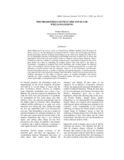The prometheus myth in the novels of william golding
Abstract
Much influenced by the horrors of the two World Wars, William Golding (1911-93) began his literary career as a novelist during the second half of the 20th century. His novels depict the intricate human psychology and lack of human relationship in an age where men actually have little to live for. In explaining occurrences in the human world Golding went back to myths, just as writers and philosophers before him had used mythical stories to interpret various human situations. Hence, Golding has taken up a number of recurring mythical motifs, and detailed examination shows how these motifs are central to explaining his complex themes. One such motif is the figure of Prometheus, a champion of mankind from Greek mythology who revolted against the immortal gods to free mankind. Classical Greek writers, such as, Aeschylus portrayed him as a rebel who ultimately reconciled himself with the immortals. However, in the Renaissance and Romantic literature Prometheus became a symbol of suffering and aspiring humanity. In modern literature, once again the role of this great hero changed. Since that heroic world is lost in our non-heroic one Golding concentrates on the fallen or debased aspects of mankind interlinked with intense suffering. So, while examining Golding's Promethean figures, this paper will try to assess the author's philosophy of reshaping the myth of Prometheus.

